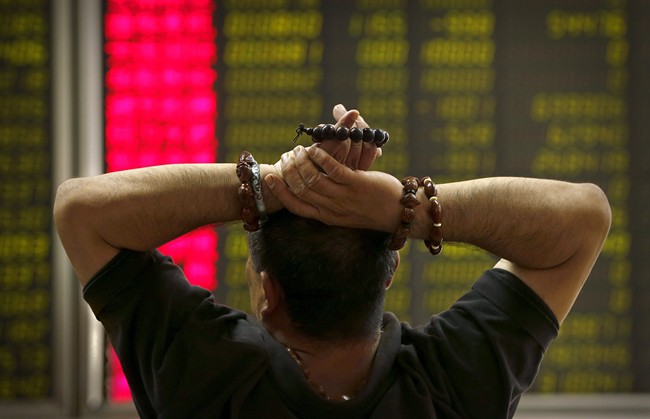VANCOUVER — China’s economy, the world’s second largest, is in a downturn and it’s taking the world’s stock markets on a rollercoaster ride with it.

The Toronto Stock Exchange lost 431 points by the time it closedMonday and the Dow Jones closed 588 points down after initially losing more than 1,000 points after the opening bell, following the biggest one-day loss on China’s stock market since 2007.
READ MORE: 5 reasons why the market meltdown matters to all Canadians
And while the market volatility is in reaction to China’s economic uncertainty and its central bank’s devaluation of the yuan this month, slow economic growth is just something we’re going to have to get used to, said BMO Capital Markets Senior Economist Jennifer Lee.
Double-digit growth in China, she said, was unsustainable and is a “thing of the past.”
Although China’s economic growth is slowing more than many economists expected — it’s growth has shrunk from 10.6 per cent in 2010 — it’s still predicted to end up at about 6.8 per cent for 2015, according to the IMF.
But in order for China to transition to a market economy it has to “let a lot of things go and sort of loosen up its grips on all aspects of the economy,” said Lee, and that includes letting its economy slow down.
- Canadian man dies during Texas Ironman event. His widow wants answers as to why
- ‘Shock and disbelief’ after Manitoba school trustee’s Indigenous comments
- Several baby products have been recalled by Health Canada. Here’s the list
- ‘Sciatica was gone’: hospital performs robot-assisted spinal surgery in Canadian first
“Fundamentally, the story is not one of collapse: it’s one of necessary adjustment,” added Dr. Yves Tiberghien, an associate professor of political science at the University of British Columbia. “It’s the natural end of the sort of overdrive model of production. Especially for the last 10 years, growth was too high by many accounts and it was driven heavily by investment.”
READ MORE: Choppy stock markets got you rattled? Check your plan
The International Monetary Fund, the World Bank and even the Chinese government have long known China needed to rebalance its economic model and “move towards consumption and towards sustainable manufacturing,” Tiberghien explained.
He said the current situation isn’t likely to turn into the U.S. stock market crash of 1929, that sparked the Great Depression, or Japan’s bubble bursting in 1990.
“In China there was a bubble. In the stock market, the bubble was simply the fact that markets went up nearly 150 per cent over a year,” Thiberghien said. “At worst it’s backtracking one year. I don’t think it’s the same level as Japan in 1990, where there had been growth for over 10 years and to levels that were very, very dangerous.”
He expects “other engines” will kick in to jump-start the Chinese economy again.
“There’s still huge urbanization needs. There’s one per cent of the population still moving from the countryside to cities every year. So there’s still huge demand for housing, for roads, for subways.”
Nonetheless, it all makes for a “difficult transition” for the rest of the world, he said, and you have to expect some bad news before seeing some good.
“The fact that you decelerate from 10 per cent to seven per cent means a lot for the market,” Tiberghien said. “So suddenly those commodity markets, which matter a lot for Canada, have reacted a lot more than the change itself.”
And for a commodity driven economy like Canada’s, China’s slower growth means less demand for resources from one of its biggest customers, said BMO’s Lee.
READ MORE: Base your vote on ‘something else’, not just economic management: economist
“You’ve been used to huge consumption of oil, of copper, of all these commodities that have made the Chinese economy boom over the past decade or so and you’re going to see some cooling from that,” she told Global News.
“Of course there are all these nightmare possibilities out there… and that’s what’s causing so much confusion and so much volatility in the markets.”
With a file from The Associated Press



Comments